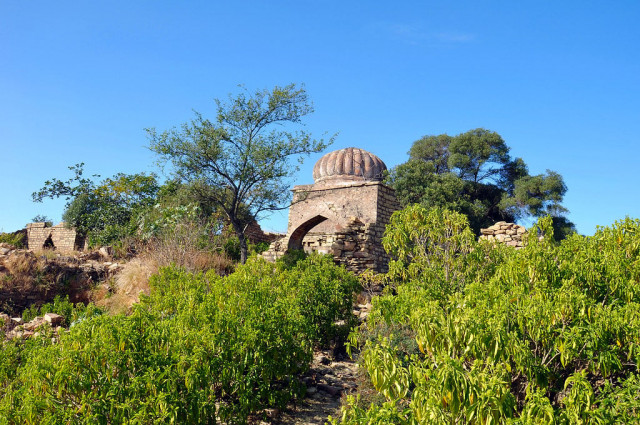Rehabilitation of prehistoric Tilla Jogian on the cards
The religious complex was of paramount importance to Hindus before being abandoned post partition

Towards the west of Jhelum, some thirty kilometres away, near the city of Dina, lie the old ruins of Tilla Jogian, a prehistoric Hindu pilgrimage center.
The abandoned temple’s origin is traced back to the 1st century and the monastic complex was an infamous gathering space for those who followed an ascetic life. Asceticism entails living a life free from all forms of indulgence and in seclusion.
Apart from hermits, conquerors like the Indian King Porus, Macdeonian King Alexander the Great, and Mughal Emperor Akbar visited Tilla Jogian to visit the jogis who resided here as per historians.
Professor Dr Hameed, a Lahore based archaeologist, while mentioning the historical background of the complex said that the jogis of old used to practice differently compared to how jogis practice now. “They used to sit in these mountains away from human settlements and look for herbs and make medicines from them,” Hameed informed.
He said that their life revolved around astrology and yoga at a time when it was not popular like it is today. “They worshipped the sun and used to sit on the area’s dunes to calculate days, months, and years,” he added.
The dunes are another reason why rulers and wanderers of the past used to visit Tilla Jogian. “There are famous stories about treasure being buried in these dunes that is why people have been coming here in different periods of time to search for it,” Hameed told The Express Tribune.
Now, this desolate prehistoric place of paramount importance to the Hindu religion, is set to be restored under the Punjab government’s project of rehabilitating religious tourist places to encourage religious tourism. Presently, the hills and surrounding forests are managed by the Punjab Forest Department and the sacred places of the Hindus are supervised by the Abandoned Waqf Property Board.
Partnering with both departments, Punjab Tourism Department plans on developing the area and renovating the ancient temple and shrine.
Asif Mehmood, advisor to the province’s Chief Minister on Tourism, talking to The Express Tribune, said that they realized that the hill was a sacred place for Hindus and as is also a center of interest for tourism enthusiasts.
“However, the access to the complex is curtailed due to a proper road so we have decided to build a jeep track to get here and provide other facilities as well,” Mehmood informed, shedding light on the department’s plans.
Baba Guru Nanak, the founder of Sikhism, was also reported as having visited the religious complex for a few weeks. Imran Gondal, Deputy Secretary of the Abandoned Waqf Property Board, believes that a place with such religious ties and historical significance deserves to be showcased to the world.
“The renovations of the ancient temple and shrine will encourage not only Hindus but people associated with other religions as well to visit such a holy place,” Gondal told The Express Tribune.
Published in The Express Tribune, October 23rd, 2021.



















COMMENTS
Comments are moderated and generally will be posted if they are on-topic and not abusive.
For more information, please see our Comments FAQ